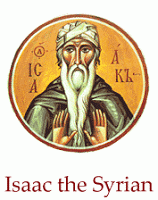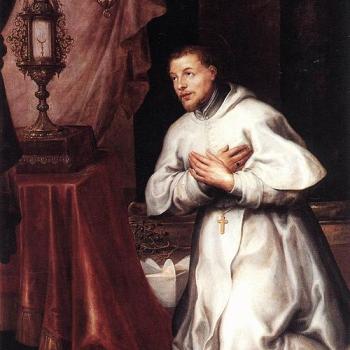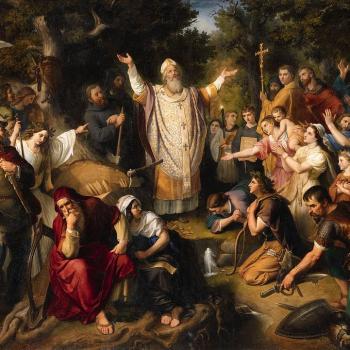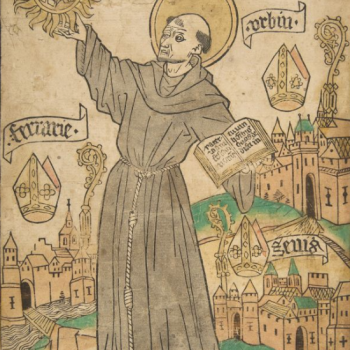One of the things that you are asked to do when you come into full communion with the Catholic Church is to take the name of one of the recognized saints of the church. As someone who has trouble deciding what shirt to wear in the morning this is something of a challenge since there are over 10,000 named saints in the Catholic church, how can you choose just one.
I considered a lot of them. I wanted to make sure I choose a saint that reflected the gifts and calling I thought that God had given me and would be a good example for the kind of life and ministry I would be involved with in the future.
I had five categories I was looking at
1. I wanted a saint that expanded my world view. Christianity has been lived in many different times and places. In each location of Christianity there is a unique incarnation of the faith as well. I wanted to choose a saint that helped me see a bigger world. Someone who came from a different place culture and time then I did. Someone who would open my eyes to new ways of seeing God and my neighbor in light of God’s grace.
2. I also wanted a saint that had been a guide to me in a meaningful way in my faith journey so far. Although there are 10,000 saints to choose from there are only a handful that have significantly impacted my life and thinking. In many ways saints are like friends. You can be introduced to them, get to know them and they can become a part of your life. I wanted to make sure the saint I choose was like that for me.
3. I wanted a saint that challenged me. People can become saints for all sorts or reasons. I wanted to make sure that the saint I choose was one that I found personally challenged me to be more of the kind of person I believed God created me to be. One that spoke straight to my heart. For me the overarching theme of my life seems to be to know and share love and grace. I wanted a saint that emphasized these things.
4. I wanted a saint that reflected my own theological values and convictions. As much as I love and respect Augustine and Aquinas their respective theological frameworks simply are not the same ones that I operate out of. I wanted to choose a saint that operated out of a framework I could connect with more. I personally feel most comfortable when God is expressed in poetry and paradox. I wanted a saint who talked about God in that way.
5. I wanted a saint that would be a symbol of unity. One that was revered by all Christians, since one of my personal missions is to work for church unity. Some saints are honored by Catholics, but not orthodox, others by Catholics and orthodox but not the Coptic church. I wanted to choose a saint that all the historical churches looked at with honor.
So given all of that I have decided on choosing Isaac the Syrian. Below are some of the ways that Issac matches up with the goals I set out for myself when choosing a saint.
- He is from a very different time and place. He lived 1300 years ago in the region of Bahrain. He offers a very different set of circumstances in which his faith was fostered and yet his words cut like daggers to the heart even to this day.
- Isaac has been a conversation in my world since 2010 or so. He was the one of the church fathers that stuck with me almost instantly as a kindred spirit. Ever since then as I have approached every new challenge in my faith I have referred back to St. Issac as a guide to help me understand it better. I even have an Icon oh him in my room which is a canstant reminder of his life, teaching, and spirituality.
- You can’t help by be challenged by Issac. His view of God’s grace is so large and his perspective on the call of the Christian life are so rigorous that he forces you to struggle with the Gospel in every aspect of your life. Although he believes that “A handful of sand, thrown into the sea, is what sinning is, when compared to God’s Providence and mercy,” he states “The knowledge of the Cross is concealed in the sufferings of the Cross.” For Isaac the mercy of God is such that it will not stop working in you until you are saved from every sin and even the desire to sin. He reminds us that “This life has been given to you for repentance; do not waste it in vain pursuits.”
- Not only does Issac share my own theological convictions, in many ways he has helped form them. As I spent years trying to figure out how to reconcile God’s justice and mercy Issac spoke short lines like poetry that opened up new worlds to me. He gave me a new way to think about salvation and the cross and in doing so opened my heart to God in a way I will never be fully able to articulate but sometimes I might be able to sing about it. This is the kind of theology I love and the world that Isaac inhabits.
- Isaac is honored in Eastern Orthodoxy, Oriental Orthodoxy, The Assyrian Church of the East, Roman Catholicism and Eastern Catholicism. You can’t get much more universal then that!














